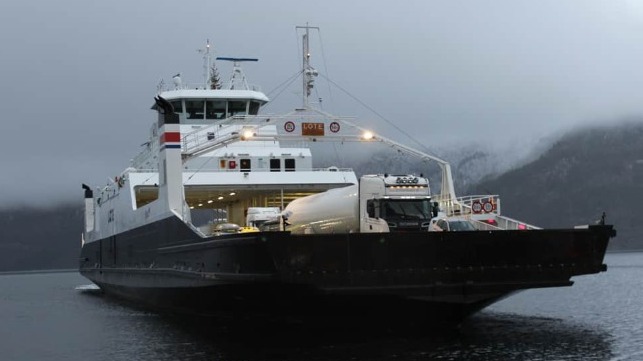Norwegian RoRo Ferries to be Converted to Battery Power

Norwegian ferry operator Fjord1 plans to covert three more of the company’s ferries from gas and diesel propulsion to zero-emission battery operations. The company, which operates 83 ferries in Norway, awarded contracts for the latest conversions which follow several other electrifications in 2020 as well as the delivery of seven hybrid-electric ferries.
The first of the vessels scheduled to undergo the conversion is the 3,000 ton MF Lote. Built in 2006, it is a RoRo ferry with a capacity of 438 passengers and car ramps at both ends permit it to load up to 120 vehicles. The vessel operates in northern Norway.
The extensive modifications for the ferry involve the conversion from diesel engines to battery-run propulsion, which will be carried out at the Havyard Lervik shipyard in Norway as the first modification contracts after the yard ends its new construction business. The vessel currently has four propulsion thrusters run by four diesel engines. They will be replaced by electric engines powered by a large battery system. The project is due to start in November 2021.
Norwegian Electric Systems AS will act as the system integrator for this project, as well as the conversion of two other Fjord1 ferries. NES will deliver power control, distribution, and battery systems for the conversions and will also be supplying equipment and control systems for four battery charging stations that Fjord1 will install in northern Norway for the operation of these ferries.
“Our role as system integrator and supplier of complete systems onboard and onshore allows us to optimize the charging versus the on-board energy requirements and thereby secure the highest possible energy efficiency,” says NES’ Martin Aasheim.
During the conversion, each of the ferries will be outfitted with batteries, charging systems, new generators, and upgrades of the AC circuit boards and automation systems. For the battery charging stations, NES will supply charging towers, power electronics, and control systems.
These projects are not only about combining different pieces of technology, explains Aasheim. As the system integrator, NES will also optimize the entire power system conversion. Previously, NES has installed battery systems on board 18 ferries.

that matters most
Get the latest maritime news delivered to your inbox daily.
“Our next step is to contribute to further optimize the ferry transport segment by improving the energy efficiency of each ferry-crossing through machine learning and partial autonomy,” says Geir Larsen, MD for NES.
The conversion program for all three of the ferries is expected to be completed by December 2022. All the ferries will operate in northern Norway.
